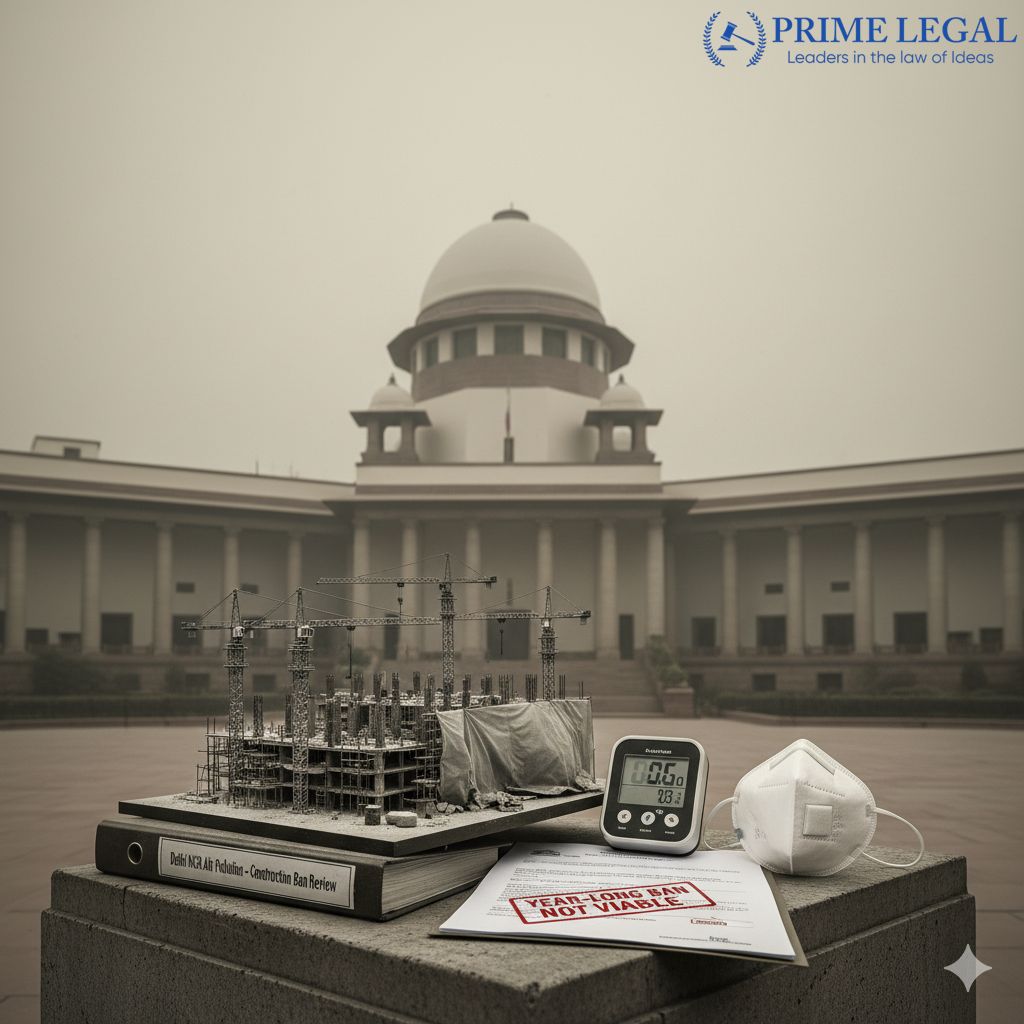INTRODUCTION
The Supreme Court of India, on 17 November 2025, while hearing the ongoing matter concerning hazardous air quality levels in Delhi–NCR observed that it was not inclined to impose extreme measures such as a year-round construction ban to improve the Air Quality Index. The proceedings form part of the case MC Mehta v. Union of India, WP (C) 13029/1985, in which the Court has been monitoring air quality concerns and has passed directives as regulatory measures in Delhi. The Court opined that a year-long ban on construction activities is not the appropriate remedy to the region’s chronic pollution crisis.
BACKGROUND
The instant matter was heard by a three-judge bench comprising Chief Justice of India BR Gavai, Justice K Vinod Chandran and Justice NV Anjaria. The matter revolves around the intense spike in the air pollution particularly during the winters which is triggered due to a combination of factors including stubble burning in neighbouring states, industrial emissions, vehicular pollution, and adverse meteorological conditions. In recent weeks, the Air Quality Index (AQI) in many parts of Delhi had crossed the “Severe” and “Severe Plus” categories necessitating judicial intervention for passing stricter directives. Presently with the AQI reaching 250, there is a critical need for a long term solution for this menace that affects the society for generations to come. The matter was discussed with the Union Government, the Commission for Air Quality Management (CAQM), and the State Government to assess both immediate and systemic solutions.
KEY POINTS
- The Supreme Court rejected the suggestion of a blanket, year-long construction ban, to improve the Air Quality Index owing to reasoning that such an order would have far-reaching consequences and jeopardize the livelihoods of millions. The situation was akin to an “emergency”, as the air quality has deteriorated to alarming levels, causing irreversible damage to the health of the people, particularly children but such a year-long ban would bring a pause to the activities of the State, bringing the economic and social life to a standstill. The bench stressed that environmental protection cannot come at the cost of economic paralysis. A large population of people from various states have their livelihood depended upon construction and work activities in Delhi-NCR.
- The Bench has asked the Ministry of Environment & Forest (MoEF) and the Chief Secretary of Delhi to come up with a long-term action plan. The Court re-emphasized the need for long term solutions and can in no way be restricted to two days or one week. Further it was pointed out that India’s AQI thresholds are set too high and fail to reflect the true severity of air quality deterioration. In India the threshold to declare ‘Severe Plus’ AQI is 450+, while, as per the WHO standard, it should be 50+.
- The emphasis was also made on the GRAP (Graded Response Action Plan) measures which are a set of incremental anti-pollution actions implemented in Delhi-NCR when air quality deteriorates to a certain threshold. It was essential that GRAP measures be triggered at a lower threshold of AQI than the present ones.
- The Court further suggested the rapid spikes in the air pollution caused due to the stubble burning and further pointed to the CAQM’s recent directions to Punjab and Haryana. The Bench observed that at this point considering the emergent situation, strict compliance to these directives could bring down the levels of pollution. The State of Punjab and Haryana have been directed to file a status report on the measures taken to curb stubble burning, contributing to the air pollution crisis in Delhi-NCR. Further the Bench sought reports from CAQM and CPCB on the measures taken to curb the worsening of the situation.
RECENT DEVELOPMENTS
During the latest hearing, the Supreme Court has asked the Union to submit a comprehensive plan outlining possible long-term strategies to address Delhi-NCR’s pollution crisis. This includes structural reforms, administrative coordination, and technological improvements. The Union has reported that the MoEF has convened a meeting with the state environmental departments to review coordinated responses.
CONCLUSION
The Supreme Court dismissing the suggestion for one-year long ban on construction activities clearly highlights how the judiciary attempted to balance urgent environmental protection and socio-economic realities. While acknowledging the severity of Delhi-NCR’s pollution crisis, the Court refused to endorse measures that would bring the essential economic activity to a standstill or disproportionately burden vulnerable groups. The Court emphasised on comprehensive, long-term strategies grounded in scientific accuracy and effective enforcement.
“PRIME LEGAL is a full-service law firm that has won a National Award and has more than 20 years of experience in an array of sectors and practice areas. Prime legal falls into the category of best law firm, best lawyer, best family lawyer, best divorce lawyer, best divorce law firm, best criminal lawyer, best criminal law firm, best consumer lawyer, best civil lawyer.”
WRITTEN BY : AMYUKTA RAJAGOPAL


